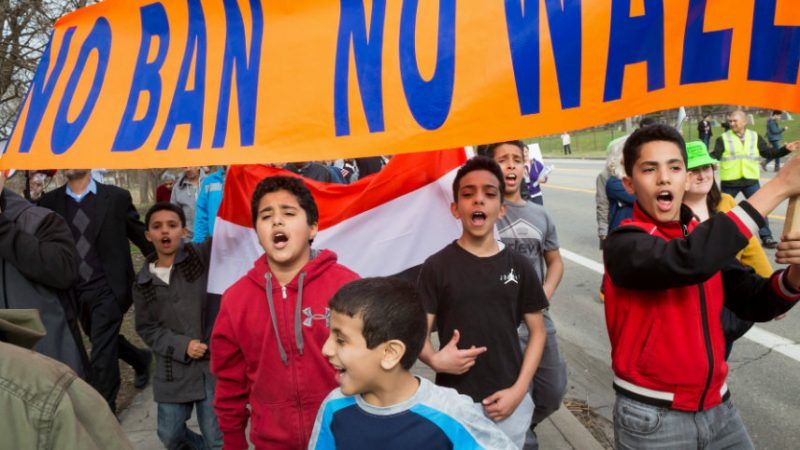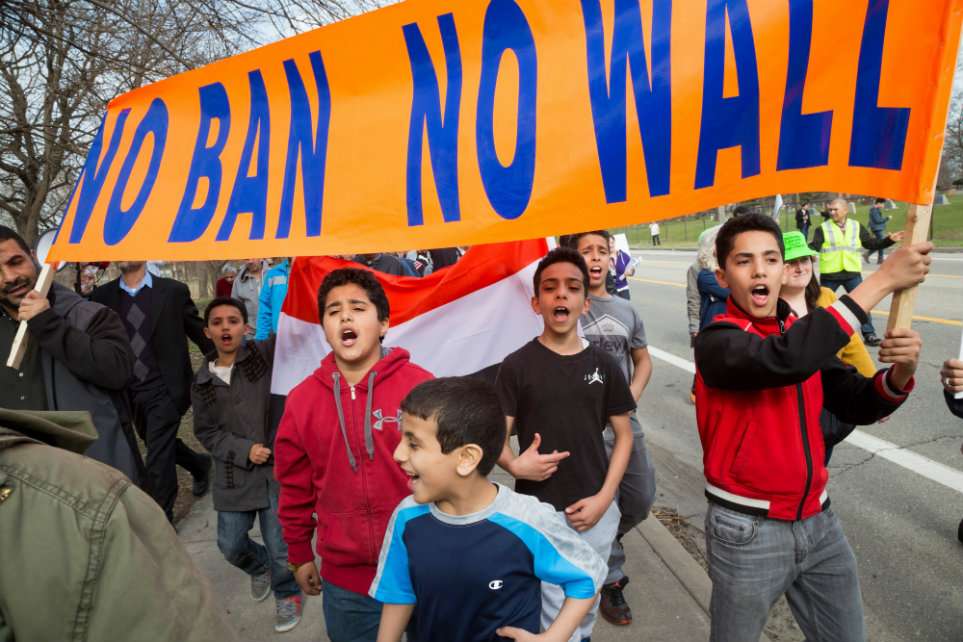His DACA Dismantling Rejected, Trump's Travel Ban Now Faces the Court: Reason Roundup
Plus: racist "promposal" is protected speech and how protectionism is killing democracy


DACA down, travel ban on trial. Calling the Trump administration's moves "arbitrary and capricious," a federal judge yesterday blocked the White House's plans to deport young immigrants who had been allowed to stay here under the Obama-era Deferred Action for Childhood Arrivals (DACA) initiative. U.S. District Judge John D. Bates said the Department of Homeland Security (DHS) didn't adequately justify its declaration that DACA is illegal, and he gave the agency 90 days to "better explain its view." If it can't, DHS "must accept and process new as well as renewal DACA applications," ruled Bates.
Now another signature part of Donald Trump's anti-immigration scheme faces a judicial test. Today the Supreme Court will consider Trump's ban on travel to the U.S. by people in a handful of majority-Muslim countries.
"Lower courts have struck down each of the three iterations of the president's proclamation, the first of which was issued just a week after he took office in January 2017," notes The Washington Post. "But the conservative-leaning Supreme Court may be Trump's best hope, and it gave the administration a boost by allowing the ban to go into effect in December while considering the challenges to it."
This is the third iterations of Trump's travel ban. Issued last fall, it originally banned visitors or immigrants from six majority-Muslim countries (Syria, Lybia, Iran, Yemen, Chad, Somalia) and two others, North Korea and Venezuela. Chad has since been removed the ban list, and North Korea and Venezuela are not part of the challenge to the ban.
As Reason's Shikha Dalmia points out, immigrants from these countries "have killed precisely zero Americans in terrorist attacks on U.S. soil between 1975 and 2015. And countries that have sent terrorists—most notably Saudi Arabia, the home of many 9/11 hijackers—aren't on the list." But Dalmia also notes that the Supreme Court isn't tasked with deciding "whether the ban is sound policy but whether it is legally valid and constitutionally permissible," and "there is a pretty good chance that it will find that it is."
Some are summing up the case as being about more than just immigration policy. "The travel-ban case is uniquely tied up with Trump's haphazard policymaking process, and with the tug of war between the president and his administration," says Axios. "The justices will even have to decide how much they care about Trump's tweets."
"In many ways, litigation arising out of the travel ban has been the biggest test case for the courts in the Trump age," suggests Texas law professor Steve Vladeck:
There are still powerful statutory, constitutional and moral arguments against even this third version of the travel ban (David Cole, the ACLU's legal director, offers a concise summary). But, unlike the first two versions, the ban is now plausibly—if superficially—defensible.
Outside of Trump's fan club, there's been surprisingly diverse antipathy to the bans—a reaction "astounding in terms of both numbers and gravitas," says NPR's Nina Totenberg. "Among those lending their expertise to three friend-of-the-court briefs are more than 55 former officials from Republican and Democratic administrations, including CIA directors, national intelligence and counterterrorism chiefs, top diplomats with long records working in the Middle East, secretaries of state, some two dozen top-ranked retired admirals and generals, a former Republican attorney general and even the Republican chairman of the 9/11 Commission."
Slavery-referencing 'promposal' sparks free-speech lesson for high schoolers (and media). A high school student in Florida apparently sought to secure a prom date with a homemade sign, posted to Snapchat, reading: "If I was black I'd be picking cotton, but I'm white so I'm picking U 4 prom?" Stories in national news outlets let to outrage over the distasteful "promposal" that went far beyond Sarasota, Florida's Riverview High School.
In a startling show of restraint (by high-school-administrator standards), the district said while the 18-year-old student, Noah Crowley, will "more than likely" face some sort of punishment, "this incident is a gray area," since Crowley's actions did not take place at school. The school's policy only prohibits certain social-media speech if leaders "reasonably believe the conduct or speech has caused or will cause actual, material disruption of school activities or a staff member's ability to perform his or her job duties." Yet a lot of the press is framing this as some sort of First Amendment failure, like the goal of public education is to punish young people for any missteps using the harshest means available.
"Just like the rest of us, students have the ability to say things that are offensive," Fred Smith Jr., an associate law professor at Emory University, tells The Washington Post. "Given that he was off of the school campus, the mere fact that his speech was offensive would strike me as an insufficient basis for the school to punish him."
On Tuesday, Crowley released a statement saying, "It was a completely joke and it went too far. After reading the texts and Snapchat's I truly see how I have offended people and I'm sorry." His family said, through a spokesperson, that he won't be attending prom. They also offered "sincere apologies for the terrible words used in his 'promposal.' As a family, we truly recognize this incident is a very difficult but important life lesson and pledge to do all we can to ensure that nothing like this ever happens again."
Saving democracy and capitalism from short-sighted leaders. Against a backdrop of the weakening of social cohesion, "liberal democratic capitalism is in retreat," writes economist Dambisa Moyo in a new book, Edge of Chaos: Why Democracy Is Failng to Deliver Economic Growth and How to Fix It. "After the fall of the Berlin Wall, this political and economic model—characterized by universal suffrage, civil rights and personal freedoms, and the individual control of capital and labor—had seemed ascendant. But now alternative models, such as authoritarianism, state capitalism, and illiberal democracies, have proliferated, offering formidable challenges to liberal democratic capitalism's model of achieving growth."
At the same time, "liberal democratic capitalism itself has become weak, corrupt, and oblivious to its own ailments," argues Moyo. "As they confront these challenges, leaders of liberal democratic capitalist nations are hobbled by the quirks of their own political systems," like satisfying the short term demands of the masses. This leads to short-term thinking and responses. And "the short-termism that clouds policymaking leads politicians to embrace inferior policies"—such as protectionism in trade and capital flows and the growth of welfare policies.
"The defining challenge of our time is to create solid and sustained economic growth that continues to meaningfully improve people's lives," suggests Moyo. "Edge of Chaos argues that liberal democracies of the sort prevalent in the West simply cannot deliver this growth without substantial reform," yet it "insists on the promise of liberal democracy."
Rather than turning away from liberal democracy, nascent democracies need to prioritize creating growth over the immediate devotion of some paradigm of democratic perfection. And established democracies must put their own houses in order by passing aggressive constitutional reforms. Above all, policymakers must face up to the facts of the twenty-first century. In an interconnected world of anemic growth, other countries' crises will become our crises, whether they take the form of terrorism, income inequality, refugees, the resurgence of infectious diseases, or illegal immigration, and governments will grow ever more fragmented and weak, further undermining an already fragile international community. For Americans, and policymakers in the world at large, protectionism and isolationism are no remedy.
QUICK HITS
- U.S. Sens. Jeanne Shaheen (D–N.H.) and Sheldon Whitehouse (D–R.I.) sent a letter yesterday to three U.S. megabanks (Bank of America, JPMorgan Chase, and Citibank) along with several European banks pressuring these finanical institutions to disclose any business with Russian oligarchs or political leaders.
- Maryland just banned not just guns with so-called "bump stocks" but even owning bump stocks on their own. The package of laws also creates a process for family members to request gun seizure of someone deemed to be a danger to themselves or others and one that would make people convicted of domestic violence provide evidence that they don't own any (legal) firearms. Gov. Larry Hogan called them "common sense, bipartisan measures."
- Coming out of its worst quarter yet, Bitcoin may be back on an upswing, having jumped in value by about 20 percent in the past week.
- Pennsylvania's Supreme Court has ordered that musician Meek Mill be released on bail. "As we have said all along, Meek was unjustly convicted and should not have spent a single day in jail," said his attorney.
- The Treasury Department is congratulating itself on the deregulatory direction it says it has been taking under Secretary Steve Mnuchin. But outside observers are skeptical there's as much going on there as Mnuchin and company claim.
- Finland is ending an experiment with universal basic income.
